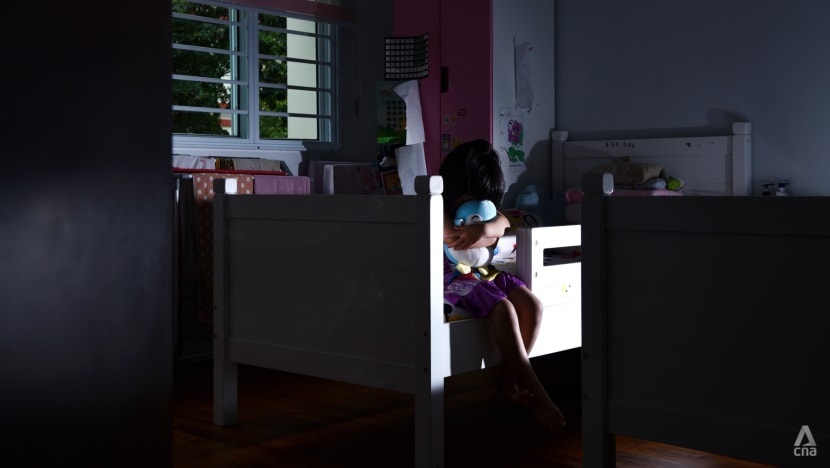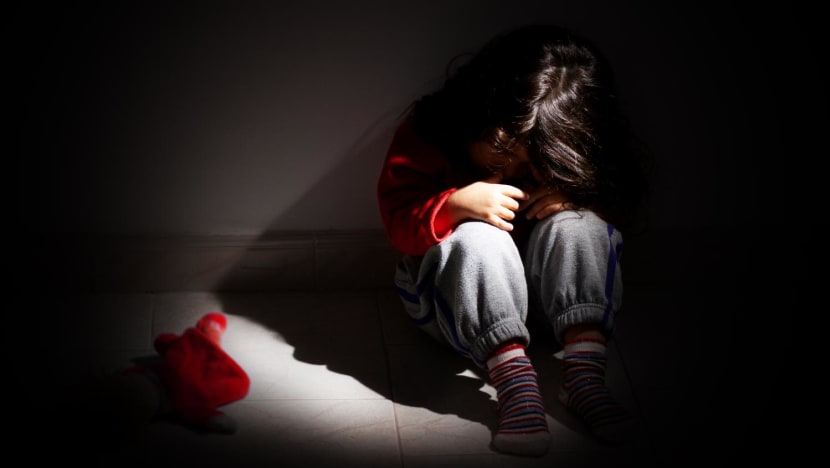‘It shook my core’: A Malaysian mum’s anguish and calls for stronger measures after her girl’s sexual abuse
A child rights advocate has also urged the Malaysian authorities to strengthen investigation procedures, increase support for survivors and ensure timely prosecution.

Photo illustration of a child in distress. (File photo: CNA/Jeremy Long)
KUALA LUMPUR: It was the Malaysian school holiday in December 2019, and Ms Anna’s* children were having a cousins’ sleepover at her mother-in-law’s place.
Before Ms Anna’s husband came to pick their children up, the mother-in-law noticed that one of them, Ira*, was not in the living room with the rest of her cousins. Ira was six years old then.
Ms Anna’s mother-in-law was told that Ira was with her uncle in his room upstairs, and she saw that the door was shut. The man and his wife, Ms Anna’s sister-in-law, lived together with the mother-in-law.
When Ira finally went downstairs, it took much convincing for her to reveal what had gone on.
“She told my mother-in-law that her uncle had called her up to play a game with her called the ‘zip game’, and that he had asked to take a picture of her, without underwear,” Ms Anna, 39, told CNA.
Later that night, Ira further said that she and her uncle had started playing this game earlier that year and repeated it on a few occasions, including once in Ira’s own home during a family barbeque.
It involved the uncle asking Ira to perform a sex act on him, Ms Anna said, although she suspects the uncle had begun grooming Ira long before 2019 by being excessively physical with her.
“Of course, it shook my core and my own perception of myself,” she said.
“I asked myself questions like how did I miss the signs? Why did she not feel safe to tell me despite his instructions? Did I not create a safe space for her? Did she think I would blame her? Is it because of my style of parenting?”
CNA reported on Sunday that child sex crimes and child sexual abuse material cases in Malaysia were on the rise.
The Royal Malaysia Police said it investigated 1,240 cases under the Sexual Offences Against Children Act - which covers children under 18 - in 2022, up from 901 cases in 2018.
Latest statistics provided show that 959 cases were opened from January to August 2023, already a higher monthly average than in 2022.
In Ms Anna’s case, she made a police report against the uncle on Dec 17, 2019. The man was arrested two days later and charged in court a few days after that, she said.
But Ms Anna soon found out that her anguish and self-blame would be aggravated by what she perceived as weaknesses in Malaysia’s justice system.
She said the uncle was eventually acquitted as the judge ruled that the prosecution did not have a prima facie case - or sufficient evidence at the initial stage to prove an offence took place.
Ms Anna questioned the “slow” legal system and how the defence was allowed to defer court hearings without “concrete reasons”, as she described how Ira was traumatised by the process.
A child rights advocate told CNA that delays in justice could be “incredibly frustrating” and further compound trauma for survivors and their families.
Dr Hartini Zainudin said she has seen some child sexual abuse cases take two years to enter the court system from the point they are reported.
To better protect survivors and their family members, she suggested that Malaysian authorities strengthen investigation procedures, increase support for survivors and ensure that prosecution is timely.
“I FELT DISCOURAGED”
In the Malaysian justice system, the prosecution proceeds first to prove that it has a prima facie case.
This is when the prosecution gets its witnesses to take the stand and tender evidence on their behalf. The defence will also scrutinise this evidence.
Ms Anna said Ira had to testify, and that her daughter had wet her bed a few times amid the traumatic legal process.
“I brought her to see a child psychologist for a few sessions to manage her emotions and expectations leading up to and during the trial process,” she said.
“Once her testimony was done with, I told her to just forget about all this and that she never has to think or speak of this anymore, unless she wanted to.”
Ms Anna said the case dragged on through “many delays” brought by the COVID-19 pandemic and the defence deferring trial dates.
In July 2022, the uncle was acquitted as the judge determined that the prosecution did not have a prima facie case, Ms Anna said.
From a legal standpoint, this means that the judge had considered submissions on the prosecution’s evidence tendered thus far, and found that he was not ready to convict the accused if the accused chose to remain silent.
The uncle did not have to enter his defence and was set free.
The prosecution then filed an appeal, but until now, Ms Anna said she has not received a hearing date as a subpoena has not been successfully delivered to the uncle.
Ms Anna criticised Malaysia’s legal system, saying she feels that it does not put in enough consideration or protection for the victim.
Based on her experience going through the system, she concluded that many families may choose not to report intra-family sex crimes as “justice is not guaranteed”, suggesting that children of Ira’s age would not have a motive to lie about being sexually abused.
“At one point, I too felt discouraged at how slow the legal process is and how the legal system in a way allows the defence to defer trial dates without concrete reasons,” she said.
PROTECTING CHILD SEXUAL ABUSE VICTIMS
Dr Hartini, who co-founded non-profit organisation Yayasan Chow Kit that supports vulnerable children in a low-income area in Kuala Lumpur, said improvements with how child sexual abuse cases are handled should start with investigative procedures.
This includes giving law enforcement agencies specialised training to handle cases of child sexual abuse, through proper collection and preservation of evidence, conducting thorough investigations, and establishing child-friendly interview techniques, she said.
“We don’t seem to implement or want to implement any child-sensitive approaches nor child competency approaches to gathering information from the survivor, or ensuring the child testimony is intact and as true to information gathered,” she added.
“It’s not unusual to have a child survivor questioned by seven different adults about the traumatising experience.”
Countries in the region use different methods of protecting child survivors of sexual abuse.
In Singapore, these victims go through a single interview to reduce the need to recount their experiences repeatedly. This also helps preserve the accuracy of their testimonies.
This interview, led by the Singapore Police Force, integrates separate interviews by parties such as child protection officers or doctors. The police may also conduct further interviews with victims.
Police officers are also trained to respond to incidents of sexual crime in a way that is more sensitive to victims. Training courses include a video developed with a women’s advocacy group.
The Royal Malaysia Police told CNA that its Sexual, Women and Child Investigations Division (D11) uses a combination of officers who are adept at interviewing sex crime victims as well as psychologists who can support child victims emotionally.
“These psychologists help us understand victims' emotional stability, and let them know what to expect (in the investigation process),” said Assistant Commissioner of Police Siti Kamsiah Hassan, D11’s principal assistant director.
“Through this psychological approach, we can make it easier for victims to cooperate with us and explain what really happened.”
TIMELY PROSECUTION
Beyond investigation, Dr Hartini suggested providing comprehensive support services for survivors, such as counselling, therapy and access to safe shelters.
“Ensuring these services are readily available and adequately funded will help survivors in their healing journey and assist them throughout the legal process or even after care support,” she said.
She also urged the police, prosecutors and the courts to improve their coordination and expedite legal proceedings. Specialised courts or dedicated judges with expertise in child sexual abuse cases could lead to faster trials and sentencing, she said.

In Singapore, sex crime victims who go to neighbourhood police centres to lodge reports can select a “sexual crime report” option at the queue management kiosks there.
The system will then immediately alert officers, who will give the victims priority and privacy.
Over in Malaysia, the government in 2017 set up a Special Criminal Court on Sexual Crimes Against Children in Putrajaya to better handle such cases.
This court would be presided over by a senior judge with 25 years of experience, and ensure no delay or postponement in the hearing of cases.
The aim then was also to expand this special court to Malaysia’s 13 states by the end of 2018.
While a second special court was set up in Kuching, Sarawak, in April 2018, there have been no further additions, sparking questions from politicians and child rights defenders who said child sex crime cases were still taking too long to be dealt with.
While Dr Hartini acknowledged that progress has been made, she said there is always room for improvement.
“It requires a collective effort from all stakeholders to continuously address the challenges and strengthen the protection of survivors and their family members within the legal and justice systems in Malaysia,” she added.
LISTEN TO YOUR CHILDREN
Following her daughter’s abuse, Ms Anna said she did not specifically seek mental health help for herself, but spoke “freely and openly” with her parents who helped console her and rebuild her confidence.
“One thing I kept focusing on is being thankful this came to light at this stage, before it progressed into him having the guts to do something to her that could potentially escalate to something much worse,” she said.
Ms Anna said her daughter did not tell of the abuse sooner as the uncle had instructed her to keep their game a “secret”.
“After many conversations, my daughter eventually told me she thought because he is an adult and her uncle, therefore there wasn't anything wrong with this game, although she felt sad about it,” she said.
“She felt like she was doing something wrong every time.”
Ms Anna said she has told Ira that she never has to see or be anywhere near the uncle any longer, and that he is no longer part of the family.
Despite that, she worries that Ira will grow up and understand the true nature of how she was abused, saying that she still thinks it was a “game”. Ms Anna has four children aged six to 12 years old. Ira is now 10 years old.
She encouraged parents of children who were sexually abused to listen to their children, take the right action, and stick with it “till the end”.
“Because even if you don't get the justice you or your children deserve, going through the act alone provides assurance to your children that you believe them, that they are loved and that they are kept whole at the end of the day,” she said.
*Names have been changed to protect their identities


















